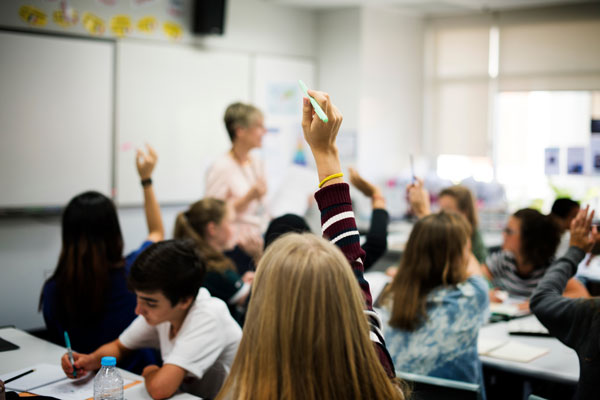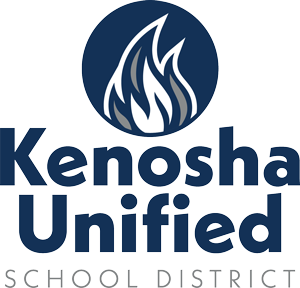Sixth Grade Academics

English Language Arts
The sixth grade English/Language Arts course provides students with instruction on reading, writing, speaking/listening, and language skills. Students will read and analyze a variety of texts in many genres. Writing instruction will focus on the writing process: planning, revising, editing and publishing specific types of writing including narrative, informative and argumentative. In addition, vocabulary, grammar, and word study (prefixes, suffixes, Greek and Latin roots) are important components of the course. Throughout the year students will work independently, in small groups, and in whole group settings. Collaboration with peers is a critical aspect of this course.
Standards
6th grade ELA Content Focus
- Discovering Your Voice: What are the ways you can make yourself heard?
- Finding Courage: How do you find courage in the face of fear?
- Surviving the Unthinkable: What does it take to be a survivor?
- Through an Animal’s Eyes: What can we learn from seeing the world through an animal’s eyes?
Novels:
- New Kid by Jerry Craft (320L)
- Front Desk by Kelly Yang(640L)
- Out of my Mind* by Sharon Draper (700L)
- Marcus Vega Doesn’t Speak Spanish By Pablo Cartaya (580L)
- Harbor Me by Jacqueline Woodson (630L)
- Sylvia & Aki by Winifred Cankling (760L)
- Alone by D.J. Brazier(700L)
- The Breadwinner by Deborah Ellis (S) (710L)
- A Long Walk to Water* by Linda Park Sue(720L)
- The One and Only Ivan by Katherine Applegate (570L)
- A Wolf Called Wander by Rosanne Parry(670L)
- Warhorse* by Michael Morpurge (730L)
Math
In 6th grade math, students focus on four main areas: understanding and solving problems with ratios, rates, and fractions (including dividing fractions and working with negative numbers); writing and solving expressions and equations; thinking statistically by analyzing and summarizing data; and building on their knowledge of area, surface area, and volume. Students learn to reason through problems, explain their thinking, and see how math concepts like multiplication, division, and variables fit together. They also develop skills in working with data and geometry, setting a strong foundation for success in later grades.
Standards
6th grade Math Content Focus
- Use concepts of ratio and rate to solve problems
- Flexibly and efficiently compute with multi-digit numbers, fractions and decimals.
- Understand the use of variables in mathematical expressions.
- Write expressions and equations that correspond to given situations, evaluate expressions, and use expressions and formulas to solve problems
- Reason about and solve one-variable equations and inequalities.
- Solve problems involving area, surface area, and volume.
- Develop understanding of statistical thinking.
Social Studies
The social studies teachers of Kenosha Unified School District believe all students should be afforded the opportunity to express themselves in a diverse community supported by a foundation based in equity. They view social studies instruction as an integral and essential part of the students’ learning experience and think it can increase critical thinking skills which foster lifelong learning. Teachers believe their focus on tolerance, acceptance, and perspective will prepare all students to thrive in a society of mixed systems, beliefs, and experiences.
In order to demonstrate success, Kenosha Unified School District social studies students will value and maintain diversity, civility, and individuality while determining their role in society. They will analyze primary sources and contextualize information while using the content to improve higher order thinking and problem-solving skills. They will also learn from the experiences and cultures of others and grow to accept the differences existing in a multicultural society. The goal of Kenosha Unified School District teachers is to graduate students who are good citizens that will positively impact society.
Standards
6th grade Social Studies Content Focus
- People, places, and ideas change over time.
- Over time, people adapt to their environment. People, places, and ideas change over time. Countries have relationships with each other.
Science
In 6th Grade Science students learn key concepts in science, such as light and matter, thermal energy, weather, and plate tectonics through investigating and making sense of real-world phenomena. .Students practice thinking and working like real scientists and engineers by doing experiments, creating models, analyzing data, solving problems, and explaining what they discover. Throughout all of this, students also practice thinking skills like finding patterns, understanding cause and effect, and using math and models. They aren’t just memorizing facts — they’re learning how to think like scientists and engineers to explain the world around them.
Standards
6th grade Science Content Focus
- Light & Matter: Explores how light interacts with matter and how we perceive images.
- Thermal Energy: Investigates how thermal energy affects the movement and properties of matter.
- Weather, Climate & Water Cycling: Explores the processes that create different weather patterns and the role of water in the climate.
- Rock Cycling & Plate Tectonics: Explores how Earth’s surface changes through plate tectonics and rock cycling.
- Natural Hazards: Investigates the causes, impacts, and preparedness strategies for natural hazards.
- Cells & Systems: Explores the structure and function of cells and how they work together to form systems in living organisms.
Social Emotional Learning
Social-Emotional Learning (SEL) is the process through which students learn to:
- Understand and manage emotions
- Build positive relationships
- Make responsible decisions
- Set and work toward goals
- Show empathy and respect for others
These essential life skills help students succeed in school, at home, and in their communities.
Middle school is a time of rapid growth and change. Students are navigating new academic challenges, peer dynamics, and a growing sense of identity. SEL provides them with the tools they need to:
- Manage stress and emotions
- Strengthen social skills
- Develop confidence and self-awareness
- Resolve conflicts peacefully
- Stay focused and motivated
Research shows that students who receive consistent SEL instruction perform better academically, show improved behavior, and experience greater emotional well-being.
To support student development, KUSD uses Second Step Middle School—a research-based, developmentally appropriate SEL curriculum designed specifically for adolescents.
Second Step Middle School helps students build essential social-emotional skills through:
- Interactive lessons that focus on emotion regulation, goal-setting, decision-making, and relationships
- Engaging discussions and real-life scenarios that connect with students’ daily experiences
- Videos, peer conversations, and reflection activities that make SEL relatable and meaningful
The program is structured around key themes that support students in navigating the social and emotional challenges of middle school in healthy, productive ways.
Art
Art is required by DPI for all 6th graders and builds on a foundation of visual literacy. Areas of knowledge and skill development include: Elements and principles of art, media exploration and technique development, art preservation and exhibition, art interaction and art as an aspect of daily life.
Standards
CTE
STEM 6 – Design and Modeling (DM), Project Lead the Way
- Course Content Focus
- Introduction to Design
- Solid Modeling
- Design Challenge
- Wisconsin Standards for Technology and Engineering
Computer Science 6 – Digital Literacy
- Course Content Focus
- Motion
- Animation and Games
- Mazes, Games, and Storytelling
- Art
- Wisconsin Standards for Information and Technology Literacy
- Wisconsin Standards for Business and Information Technology
World Language
COMMUNICATION is at the heart of Kenosha Unified School District’s world language program, whether the communication takes place face-to-face, in writing, or across centuries through literature. Through the study of a world language, students will gain a knowledge and understanding of the CULTURES of the world; in fact, students cannot truly master a language until they have also mastered the cultural contexts in which the language occurs. Learning any world language provides students with CONNECTIONS to additional bodies of knowledge. Through COMPARISONS and contrasts with a world language, students will develop a greater insight into their own language and culture and realize that there are multiple ways of viewing the world. Together, these elements enable students to participate in multilingual COMMUNITIES at home and around the world.
Learning experiences in a world language classroom are designed to help students meet the National Standards for Foreign Language Learning of the 21st Century. These standards define in a larger context, what students should know and be able to do after a sequence of world language instruction.
- Standard 1: Communication – Communicate in a world language
- Standard 2: Cultures – Gain knowledge and understanding of the cultures of the world
- Standard 3: Connections – Use world language to connect with other disciplines and expand knowledge
- Standard 4: Comparisons – Develop insight through world language into the nature of language and culture
- Standard 5: Communities – Use world language to participate in communities at home and around the world
Rosetta Stone
For more information on each language provided through Rosetta Stone, please click on the link below:
Contact Information
Che Kearby
Coordinator of Secondary ELA & Social Studies
ckearby@kusd.edu
262-359-7391
Christine O’Regan
Coordinator of Library Media & Instructional Technology
coregan@kusd.edu
262-359-7444
Sarah Shanebrook Smith
Coordinator of Language Acquisition
sshanebr@kusd.edu
262-359-5909
Jennifer Lawler
Coordinator of Secondary Math & Science
jlawler@kusd.edu
262-359-7003
Bryan Mogensen
Coordinator of Athletics/Physical Education
bmogense@kusd.edu
262-359-6384
Aaron Williams
Coordinator of Career & Technical Education
awilliam@kusd.edu
262-359-6313
Scott Plank
Coordinator of Fine Arts
splank@kusd.edu
262-359-6389
Laura Stone
Coordinator of Student Support
lstone@kusd.edu
262-359-2492
